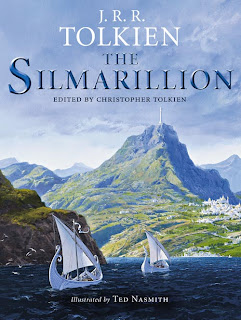Favorite Quote: "For from his first days in Gondolin he had borne a grief, ever worsening, that robbed him of all joy: he loved the beauty of Idril and desired her, without hope. [...] And however that might be, Idril loved Maeglin not at all [...] But as the years passed still Maeglin watched Idril, and waited , and his love turned to darkness ain his heart. [...] Thus it was in Gondolin; and amid all the bliss of that realm, while its glory lasted, a dark seed of evil was sown" (139).
I think that this idea of unrequited love is something that many people can connect to. Maeglin's feelings are not returned and it causes him much pain. It is intriguing to see that out of something so good and pure, Love, such maliciousness and evil can spring forth. I think that Tolkien uses this situation to show the connection between good and bad. It runs much deeper than anyone thinks it does, so that out of pure, or thought to be pure, goodness, evil can grow. Tolkien personifies this drive to harm and corrupt as Morgoth, a being of power which constantly withstands the assaults of the other powerful beings, or Valar, attempting to stop his evil.
Although there is a very distinct separation between what the Elves, or Eldar, are and the race of Man, the Elves seem all too suceptable to the same faults of humanity. Their feelings are the same: jealousy, vengeance, animosity. The Elves seem very "human" in their own right, behaving much like us and differing in their immortality and physical forms. They are more advanced than the Men in the book, but this is only because they were created first. It's rather interesting to see how the Elves regard Men as inferior and lower life forms, even though they themselves act like Men do too!
I'm not going to lie. The Silmarillion is a very intricate book, and it's taking me a while to get through it. There's many different people, places, and events which get tangled up a bit in my head sometimes, so I need to go back and reread sections quite frequently. However, I am enjoying the book quite thoroughly, and the stories are just fascinating.
My rating of the book so far: 10/10

 (the Mist sent by Morgoth poisoned some mountains, evil tainting pure nature)
(the Mist sent by Morgoth poisoned some mountains, evil tainting pure nature)















